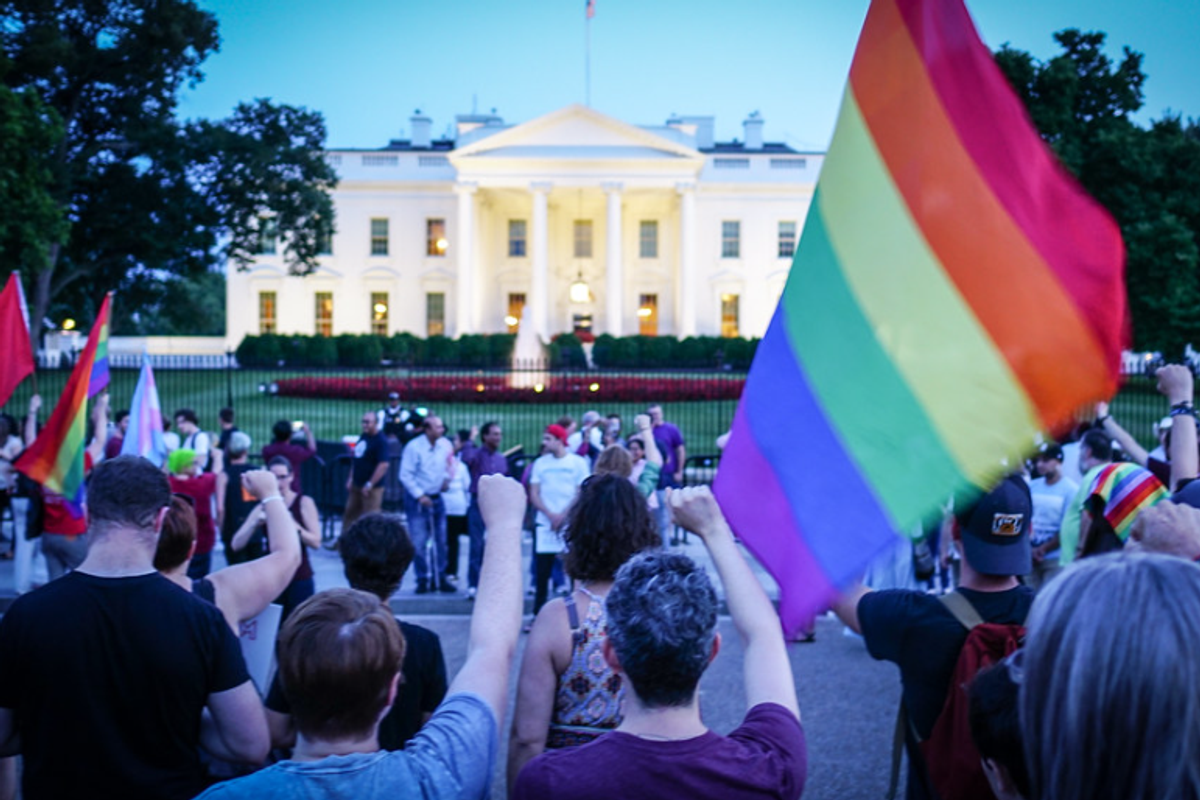Over 800 LGBTQ troops kicked out under ‘Don’t Ask, Don’t Tell’ get upgraded to honorable discharges
The Pentagon is trying to right the wrongs of the discriminatory policy.

Protestors with a Pride flag outside of the White House.
The Pentagon announced on Tuesday, October 15, that it has restored the honor of more than 800 LGBTQ veterans discharged from the military under the “Don’t Ask, Don’t Tell” policy. "Under President Biden's leadership, the Department of Defense has taken extraordinary steps to redress the harms done by ‘Don't Ask, Don't Tell’ and other policies on these former Service members," Secretary of Defense Lloyd J. Austin announced in a statement.
The Pentagon's discharge status upgrades from dishonorable to honorable are a way to atone for the discriminatory policies it has enacted in the past. However, they also unlock access to veterans benefits for those affected by the policy.
For decades, many who bravely served their country couldn't access military benefits, including health care, college tuition, VA loan programs and some jobs. A defense official said that veterans affected by the upgrade will be sent information on how to get copies of their new, honorable discharge certification.
“We will continue to honor the service and the sacrifice of all our troops—including the brave Americans who raised their hands to serve but were turned away because of whom they love,” Austin said. The restoration of these veterans' honor comes a year after the Pentagon launched a review of military records of LGBTQ people discharged with a less-than-honorable status.
Under @POTUS' leadership, the Department of Defense has taken extraordinary steps to redress the harms done by “Don’t Ask, Don’t Tell” and other policies on former Service members who are LGBTQ+. Read my full statement: pic.twitter.com/3wbh8nI3pP
— Secretary of Defense Lloyd J. Austin III (@SecDef) October 15, 2024
The “Don't Ask, Don’t Tell Policy” came as a compromise between the Bill Clinton Administration and the Pentagon that began as an attempt to end 8 decades of LGBTQ discrimination in the military. Up to that point, over 100,000 LGBTQ veterans had been kicked out of the armed services due to their sexuality.
The Clinton Administration promised to overturn the discriminatory policies until a Military Working Group determined that homosexuality was “inconsistent” with military service. These findings resulted in a compromise: Gay people could serve in the military as long as their sexuality remained a secret.
The "Don’t Ask, Don’t Tell" policy was in place between 1994 and 2011, and during that time, 13,500 military members were forced out of service. The majority were given honorary discharges; however, about 2,000 were separated with less-than-honorary distinctions.
“It’s really hard to truly wrap your head around the fear of living under ‘Don’t Ask, Don’t Tell.’ The possibility that if someone found out about you, your entire life in the military could go away – that fear was a constant. That is sometimes lost when we talk about this policy, how it drains on you … you have to act for your personal sanity,” Gina Ortiz Jones, Under Secretary of the Air Force, reflected on the 10th anniversary of its repeal.
“The military is known for its bonds,” Jones continued. “But you can’t have those bonds when you can’t share your life or talk about your family with those you serve alongside. And when you’re in the military, your entire family serves – it’s hard to have seen how that would happen if the policy didn’t change.”
‘Don’t Ask, Don’t Tell’ was repealed on September 20, 2011, and service members discharged for their sexuality were allowed to re-enroll. Future recruits who joined the military were now free to do so without fear of facing discrimination for their sexuality.





 Buddy Holly was 20 years old in this photo.
Buddy Holly was 20 years old in this photo.  30 going on 60…
30 going on 60… Dexters Laboratory What A Fine Day For Science GIF
Dexters Laboratory What A Fine Day For Science GIF The bread doesn't lie. Facebook/Jaralee Metcalf
The bread doesn't lie. Facebook/Jaralee Metcalf How do you measure success as a stay-at-home mom?
How do you measure success as a stay-at-home mom? Work done in the home is never "done" and often goes unrecognized.
Work done in the home is never "done" and often goes unrecognized.  Validation comes in different ways for stay-at-home moms.
Validation comes in different ways for stay-at-home moms. Jennifer Dzuria's Tumblr post on alcohol. via Tumblr
Jennifer Dzuria's Tumblr post on alcohol. via Tumblr Jennifer Dzuria's Tumblr post on alcohol. via Tumblr
Jennifer Dzuria's Tumblr post on alcohol. via Tumblr A bartending mixing up a cool drink. via
A bartending mixing up a cool drink. via  A man and a woman having a conversation at a bar.via
A man and a woman having a conversation at a bar.via